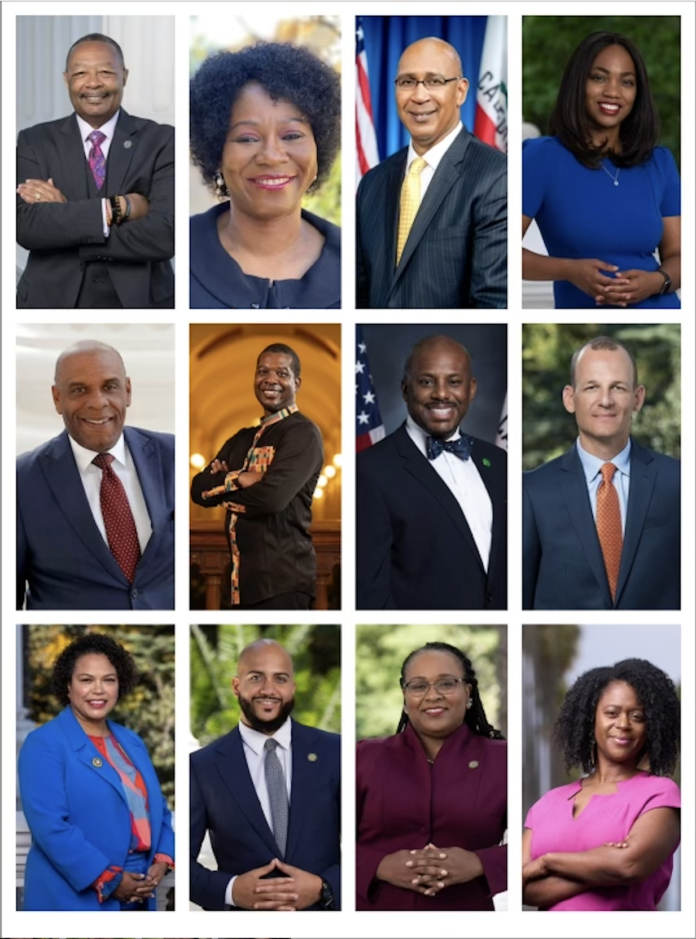
By Antonio Ray Harvey, California Black Media
The California Legislative Black Caucus (CLBC) was established in 1967 when African American members of the California Legislature, under the leadership of former State Sen. Mervyn Dymally, came together to address issues faced by Black Californians.
The origins of the CLBC date back to 1918 when Frederick M. Roberts was elected to the California State Assembly. Roberts was the first African American to serve in the California State Legislature. In those early years, legislative efforts focused on abolishing laws and policies that restricted African Americans from fully exercising their civil, social and political rights.
Among these initiatives was a bill authored by Roberts in 1921 that prohibited the publication of education materials that portrayed negative images of people of color. Roberts also authored landmark civil rights legislation in 1919 and 1923, guaranteeing African Americans access to public accommodations.
During the 1960s, members believed that a caucus representing concerns of the African American community would provide political influence and visibility far beyond their numbers.
Today, the CLBC consists of 12 members.
Throughout its history, the CLBC and African American members of the legislature have been instrumental in crafting and supporting legislation that fosters racial and gender equality as well as advancing an agenda that assures quality health care for all, focuses on employment and economic security, and advocates for justice for all Californians.
During the 2024 legislative session, the CLBC hopes to secure funding for critical programs and organizations working to improve the lives of Black Californians.
In addition, the CLBC will continue to support programs that encourage academic excellence. Two examples are the caucus’s Frederick M. Roberts college scholarship program, which provides scholarships to college-bound students, and the African American Leaders For Tomorrow program, a training institute for high school aged students.
California Black Media spoke with Assemblymember Lori D. Wilson (D-Suisun City), chair of the CLBC, about the organization’s priorities, challenges and plans for the next legislative session.
What does your organization do to improve the lives of Black people in California?
The 12 members of the California Legislative Black Caucus collaboratively develop and advocate for policies addressing economic justice, education, healthcare, criminal justice reform, and other issues impacting Black Californians. In 2024, the Caucus is prioritizing a reparations legislative package in response to the historic two-year Reparations study and report.
What was your greatest success over the course of the last year?
In 2023, the Caucus achieved legislative success by securing significant investments for institutions and programs supporting Black lives and advancing justice totaling more than $320 million dollars. Additionally, we introduced 10 legislative priorities, with three chartered into law.
Our nonprofit arm raised close to $3 million, funding our signature events and programs, like our annual Frederick Roberts college scholarship program, which supported 150 students this year with
$3,500 awards, and our annual African American Leaders for Tomorrow program at California State Dominguez Hills.
CBM: In your view, what is the biggest challenge Black Californians face?
Housing, education, public safety and equity across the board remain the most significant challenges.
What was your organization’s biggest challenge?
Despite our best efforts to pool resources and collaborate with strategic partners, the ongoing challenge is the insufficient funding to address the breadth of issues faced by Black communities.
Does your organization support or plan to get involved in the push for reparations in California?
Absolutely. We are actively preparing for the 2024 legislative fight for reparations. Two of our caucus’s seasoned legislators, Sen. Bradford and Assemblymember Jones-Sawyer, served on the reparations task force. From the two-year study, we have created a framework to achieve legislative and budget wins as well as to work collaboratively with strategic partners up and down the state.
How can more Californians of all backgrounds get involved in the work you’re doing?
We encourage all Californians to support Black legislators and join the movement to advocate for a better California for all, ensuring fair, just, and equitable representation. Participation is crucial for creating positive and transformational change in California.



